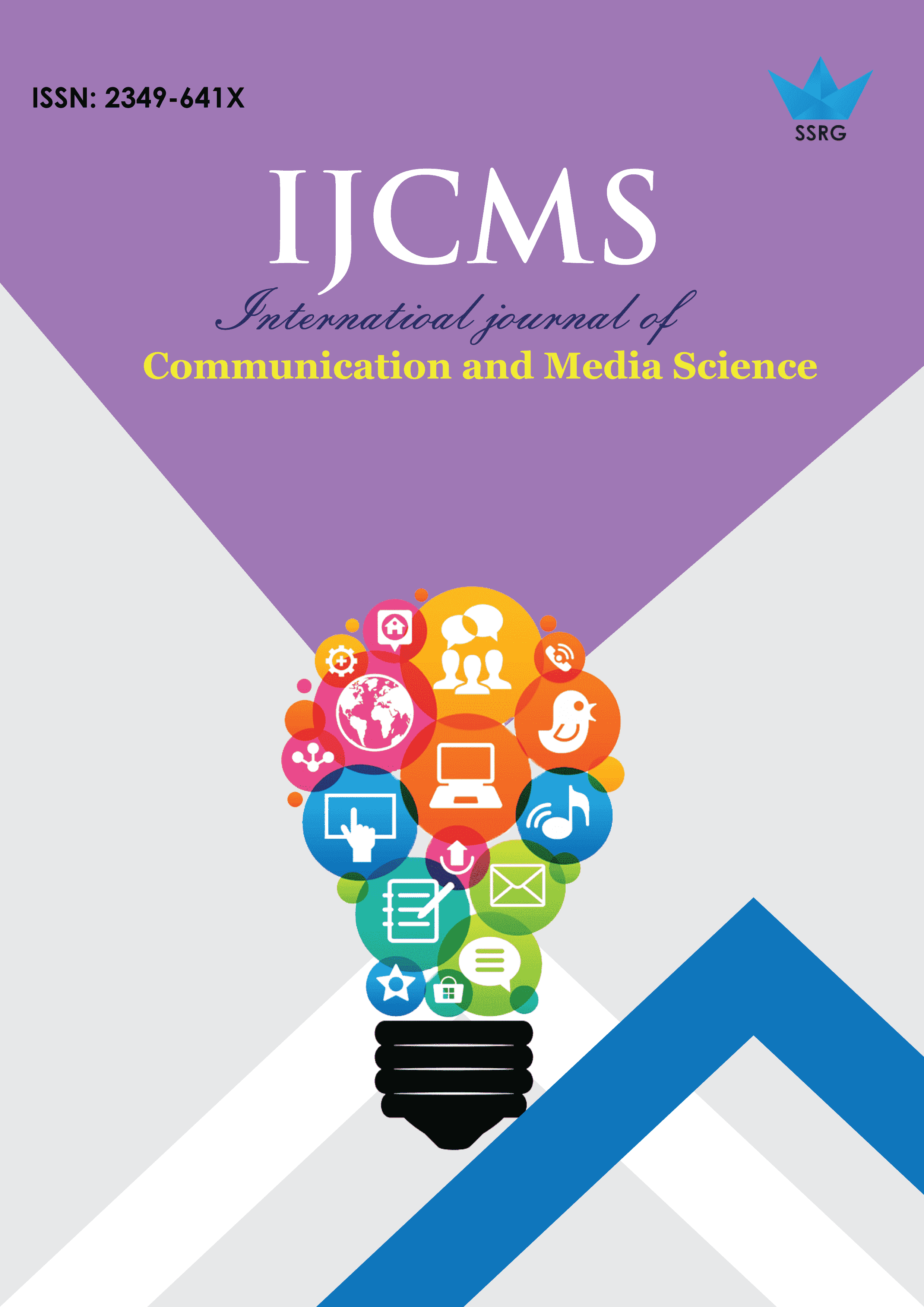Patterns of Ownership and Location of Radio Stations in Cameroon. An Empirical Analysis

| International Journal of Communication and Media Science |
| © 2017 by SSRG - IJCMS Journal |
| Volume 4 Issue 3 |
| Year of Publication : 2017 |
| Authors : Henry Zuyingong Muluh |
How to Cite?
Henry Zuyingong Muluh, "Patterns of Ownership and Location of Radio Stations in Cameroon. An Empirical Analysis," SSRG International Journal of Communication and Media Science, vol. 4, no. 3, pp. 13-23, 2017. Crossref, https://doi.org/10.14445/2349641X/IJCMS-V4I6P101
Abstract:
This research is an empirical investigation into the situation of radio broadcasting in Cameroon. A survey of private radio stations in Cameroon in 2012 is the basis of this study. The study had as objective to identifypatterns of ownership and location of radio stations in Cameroon. It employs a descriptive quantitative analysis with data collected from secondary evidence and primary data from private radio station managers. It concludes that while there is a multiplicity and plurality of radio stations in Cameroon these stations are also haphazardly located. The location is also skewed towards the urban centres thereby creating media rich and media poor areas. The study therefore recommends a proper legal framework that also determines the location of radio stations.
Keywords:
The study therefore recommends a proper legal framework that also determines the location of radio stations.
References:
[1] Alobwede, C. E. (2006) African Media Development Initiative: Cameroon. Research Findings and Conclusions. London: BBC World Service Trust.
[2] Asonganyi, Tazoacha (2013) The Press: Vehicle of Knowledge; Sacred Instrument for Control of Government Action. Cameroon Politics, Yahoo Group, as accessed on 16th September, 2013.
[3] Berger, Guy (2007) Media Legislation in Africa: A Comparative Legal Survey. UNESCO, School of Journalism and Media Studies, Rhodes University, South Africa.
[4] Boh, H. (1998) State of the Media in Cameroon. Yaoundé: Friedrich Ebert Foundation.
[5] Chaffee, S and Wilson, D, Media Rich, Media Poor: Two Studies of Diversity in Agenda-Holding in Journalism Quarterly, 1977, p. 466-476.
[6] Coman, Mihai. (2000) Developments in Journalism Theory About media in “Transition” in Central and Eastern Europe 1990-99 in Journalism Studies, Vol.1 No. 1, 2000, pp. 35-56.
[7] Eoné, Tjade, (1986) Radios, Publics et Pouvoir au Cameroon: Utilisations Officielles et Besoins Sociaux. Paris: L’Harmattan.
[8] Ewumbue-Monono Churchill, (1992) The Right to Inform and the 1990 Press Law in Cameroon. In Africa Media Review Vol. 6 No. 3 1992, p. 19-29.
[9] Friedrich-Ebert-Stiftung (FES) 2008, African Media Barometer: First home-grown analysis of the media landscape in Africa, Cameroon 2008. FES Media Project Southern Africa Windhoek, Namibia.
[10] Friedrich-Ebert-Stiftung (FES) 2011, African Media Barometer: Cameroon 2011. fesmedia Africa, Windhoek, Namibia.
[11] Gallagher, (1991) Public and Private Press in Cameroon.Changing Roles in the New Pluralism. From: http://www.lightningfield.com/cameroon/ contents.html. As accessed on March 6th 2010.
[12] Katz, E and Wedell, G. (1978) Broadcasting in the Third World: Promise and Performance. London: MacMillan.
[13] Loh, Choves (2013) Ugly Journalism (No Publisher) McQuail, D (1994) Mass Communication Theory: An Introduction, Third Edition, London, Sage Publications.
[14] McQuail, D (2005) McQuail’s Mass Communication Theory, Fifth Edition, London, Sage Publications.
[15] McLeish, Robert (1999) Radio Production. A Manual for Broadcasters, Fourth Edition. London: Focal.
[16] Mendo Ze, G & Hond, T (2005) UneDecennie de Communication Sociale au Cameroun (1990-2000). Aspects Juridico-InstitutionnelsetAnalyse Critique de L’Environnement de La PresseLibre. Yaounde: SOPECAM.
[17] Ndangam, Lilian (2006) ‘Gombo’: Bribery and the Corruption of Journalism in Cameroon. In Equid Novi, Vol. 27 (2) 177-197.
[18] Ndangam, Lilian (2008) Free Lunch? Cameroon’s Diaspora and Online News Publishing. In New Media and Society, Vol. 10 No. 4 August 2008, p.585-604.
[19] Nyamnjoh, F (1998) Media Ownership and Control in Cameroon: Constraints on media Freedom.In Media Development, Issue 4, 1998. As accessed from http://www.nyamnjoh.com /2004/12/media_ownership.html
[20] Nyamnjoh, Francis (2005) Africa’s Media. Democracy and the Politics of Belonging. London: Zed Books.
[21] Takougang.J and Krieger, M. (1998) African State and Society in the 1990s: Cameroons Political Cross Roads, Colorado USA & Oxford UK: Westview Press.
[22] Tanjong, E (2012) Media Balance in sub-Saharan Africa's Fragile Democracy: Analysis of Journalism Practice in Cameroon, Design House, Limbe.
[23] Tanjong, E and Muluh, H (2006) Barriers to Indigenous Language Press in Cameroon. In Indigenous Language Media in Africa, Abiodun Salawu (Ed) CBAAC, Lagos.
[24] Tudesq, André –Jean, (1995) Feuilles d’Afrique : Etude de la Presse de l’Afrique Subsaharienne.Paris : Editions de la Maison des Sciences de l’Homme d’Aquitaine, Talence.
[25] Tudesq, Andre-Jean, (1995) Journaux et radios en Afrique aux xixesiècles.Paris : Ellipses/ Edition Marketing.
[26] Tudesq, Andre-Jean, (1999) Les Medias en Afrique. Paris: Ellipses/Edition Marketing.
[27] Tumi, Christian Cardinal (2006) The Political Regimes of Ahmadou Ahidjo and Paul Biya, and Christian Tumi, priest. New Delhi, India: Pitambar Publishing House Co. (P) Ltd.
[28] UNESCO Institute for Statistics (2012).The Media Landscape In 28 Countries.
[29] Results From A UIS Pilot Survey. Montreal, Canada. From http://www.uis.unesco.org/ Communication/Documents/Media-statistics-pilot-survey-report.pdf. Accessed on 28/07/2013
[30] UNESCO Institute for Statistics (May, 2013). The Media Landscape in 54 Countries. Country profiles from the 2011 and 2012 UIS pilot surveys. Montreal, Canada. From: http://www.uis.unesco.org/Communication/ Documents/Media-statistics-pilot-survey-country-profiles.pdf. Accessed on 02/08/2013
[31] UNESCO, (2003) Legislation on Community Radio Broadcasting: Comparative study of the legislation of 13 countries. Division for Freedom of Expression, Democracy and Peace, Communication and Information Sector.
[32] Wingfield, Betty and Peng, Zengjun (2005) Market or Party Controls? Chinese Media in Transition. In Gazette: The International Journal for Communication Studies, Vol. 67 (3): 255-270.
[33] Wete, F (1998) Media Ownership and Control in Cameroon. A Historical Analysis. Paper presented at Conference on Media Ownership and Control in Africa, Yaounde, 1998.

 10.14445/2349641X/IJCMS-V4I6P101
10.14445/2349641X/IJCMS-V4I6P101